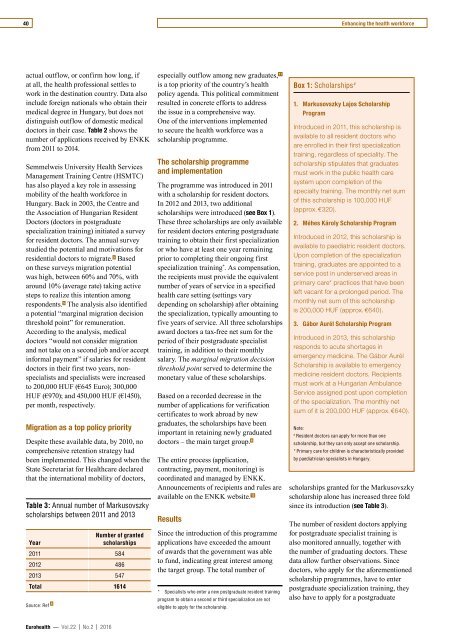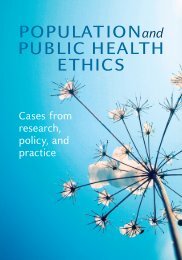EUROHEALTH
Eurohealth-volume22-number2-2016
Eurohealth-volume22-number2-2016
You also want an ePaper? Increase the reach of your titles
YUMPU automatically turns print PDFs into web optimized ePapers that Google loves.
40<br />
Enhancing the health workforce<br />
actual outflow, or confirm how long, if<br />
at all, the health professional settles to<br />
work in the destination country. Data also<br />
include foreign nationals who obtain their<br />
medical degree in Hungary, but does not<br />
distinguish outflow of domestic medical<br />
doctors in their case. Table 2 shows the<br />
number of applications received by ENKK<br />
from 2011 to 2014.<br />
Semmelweis University Health Services<br />
Management Training Centre (HSMTC)<br />
has also played a key role in assessing<br />
mobility of the health workforce in<br />
Hungary. Back in 2003, the Centre and<br />
the Association of Hungarian Resident<br />
Doctors (doctors in postgraduate<br />
specialization training) initiated a survey<br />
for resident doctors. The annual survey<br />
studied the potential and motivations for<br />
residential doctors to migrate. 5 Based<br />
on these surveys migration potential<br />
was high, between 60% and 70%, with<br />
around 10% (average rate) taking active<br />
steps to realize this intention among<br />
respondents. 5 The analysis also identified<br />
a potential “marginal migration decision<br />
threshold point” for remuneration.<br />
According to the analysis, medical<br />
doctors “would not consider migration<br />
and not take on a second job and/or accept<br />
informal payment” if salaries for resident<br />
doctors in their first two years, nonspecialists<br />
and specialists were increased<br />
to 200,000 HUF (€645 Euro); 300,000<br />
HUF (€970); and 450,000 HUF (€1450),<br />
per month, respectively.<br />
Migration as a top policy priority<br />
Despite these available data, by 2010, no<br />
comprehensive retention strategy had<br />
been implemented. This changed when the<br />
State Secretariat for Healthcare declared<br />
that the international mobility of doctors,<br />
Table 3: Annual number of Markusovszky<br />
scholarships between 2011 and 2013<br />
Number of granted<br />
Year<br />
scholarships<br />
2011 584<br />
2012 486<br />
2013 547<br />
Total 1614<br />
Source: Ref 6<br />
especially outflow among new graduates, 11<br />
is a top priority of the country’s health<br />
policy agenda. This political commitment<br />
resulted in concrete efforts to address<br />
the issue in a comprehensive way.<br />
One of the interventions implemented<br />
to secure the health workforce was a<br />
scholarship programme.<br />
The scholarship programme<br />
and implementation<br />
The programme was introduced in 2011<br />
with a scholarship for resident doctors.<br />
In 2012 and 2013, two additional<br />
scholarships were introduced (see Box 1).<br />
These three scholarships are only available<br />
for resident doctors entering postgraduate<br />
training to obtain their first specialization<br />
or who have at least one year remaining<br />
prior to completing their ongoing first<br />
specialization training * . As compensation,<br />
the recipients must provide the equivalent<br />
number of years of service in a specified<br />
health care setting (settings vary<br />
depending on scholarship) after obtaining<br />
the specialization, typically amounting to<br />
five years of service. All three scholarships<br />
award doctors a tax-free net sum for the<br />
period of their postgraduate specialist<br />
training, in addition to their monthly<br />
salary. The marginal migration decision<br />
threshold point served to determine the<br />
monetary value of these scholarships.<br />
Based on a recorded decrease in the<br />
number of applications for verification<br />
certificates to work abroad by new<br />
graduates, the scholarships have been<br />
important in retaining newly graduated<br />
doctors – the main target group. 6<br />
The entire process (application,<br />
contracting, payment, monitoring) is<br />
coordinated and managed by ENKK.<br />
Announcements of recipients and rules are<br />
available on the ENKK website. 12<br />
Results<br />
Since the introduction of this programme<br />
applications have exceeded the amount<br />
of awards that the government was able<br />
to fund, indicating great interest among<br />
the target group. The total number of<br />
* Specialists who enter a new postgraduate resident training<br />
program to obtain a second or third specialization are not<br />
eligible to apply for the scholarship.<br />
Box 1: Scholarships #<br />
1. Markusovszky Lajos Scholarship<br />
Program<br />
Introduced in 2011, this scholarship is<br />
available to all resident doctors who<br />
are enrolled in their first specialization<br />
training, regardless of speciality. The<br />
scholarship stipulates that graduates<br />
must work in the public health care<br />
system upon completion of the<br />
specialty training. The monthly net sum<br />
of this scholarship is 100,000 HUF<br />
(approx. €320).<br />
2. Méhes Károly Scholarship Program<br />
Introduced in 2012, this scholarship is<br />
available to paediatric resident doctors.<br />
Upon completion of the specialization<br />
training, graduates are appointed to a<br />
service post in underserved areas in<br />
primary care* practices that have been<br />
left vacant for a prolonged period. The<br />
monthly net sum of this scholarship<br />
is 200,000 HUF (approx. €640).<br />
3. Gábor Aurél Scholarship Program<br />
Introduced in 2013, this scholarship<br />
responds to acute shortages in<br />
emergency medicine. The Gábor Aurél<br />
Scholarship is available to emergency<br />
medicine resident doctors. Recipients<br />
must work at a Hungarian Ambulance<br />
Service assigned post upon completion<br />
of the specialization. The monthly net<br />
sum of it is 200,000 HUF (approx. €640).<br />
Note:<br />
#<br />
Resident doctors can apply for more than one<br />
scholarship, but they can only accept one scholarship.<br />
* Primary care for children is characteristically provided<br />
by paediatrician specialists in Hungary.<br />
scholarships granted for the Markusovszky<br />
scholarship alone has increased three fold<br />
since its introduction (see Table 3).<br />
The number of resident doctors applying<br />
for postgraduate specialist training is<br />
also monitored annually, together with<br />
the number of graduating doctors. These<br />
data allow further observations. Since<br />
doctors, who apply for the aforementioned<br />
scholarship programmes, have to enter<br />
postgraduate specialization training, they<br />
also have to apply for a postgraduate<br />
Eurohealth — Vol.22 | No.2 | 2016
















